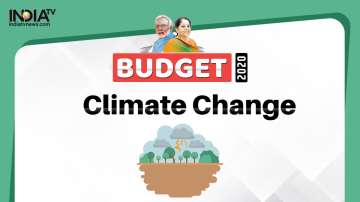Union Budget 2020: What Nirmala Sitharaman needs to do to tackle Climate Change
As Finance Minister Nirmala Sitharaman gets ready to present the Union Budget 2020, the whole country is waiting to see whether the government will also focus on the common good in addition to improving the fiscal situation.

As Finance Minister Nirmala Sitharaman gets ready to present the Union Budget 2020, the whole country is waiting to see whether the government will also focus on the common good in addition to improving the fiscal situation. While the 2020 Union Budget has already been prepared, the question arises--What should the Union Budget do to combat climate change?
Climate Change and environmental degradation are one of the biggest challenges that the world is facing. Rising temperatures, growing incidents and intensity of extreme weather events, the threat of extinction of a million species, the destruction of forests, the warming of oceans and the disruption of ecosystem services that sustain life on the planet are among the top risks.
Countless droughts, floods, hurricanes and cyclones, and forest fires have provided a glimpse of the devastation that climate change and environmental degradation can cause. Climate change is no longer something in the future. Scientists have continuously stressed that the window to limit the most catastrophic impacts of global warming is small.
A recent report by the environmental think tank Germanwatch ranks India as the fifth-most vulnerable country in terms of extreme weather events. Studies show that the current level of efforts to slow down global warming will see average temperatures in India rise by 1-2° C by 2050. We cannot ignore the fact that climate change will have deep economic and social impacts. A report by McKinsey estimates that unchecked climate change could cause a reduction of 2.5-4.5% of GDP.
Economic Survey 2020
- According to the Survey, India is rightly moving forward on the path of Sustainable Development Goals (SDG) implementation. The states like Himachal Pradesh, Chandigarh, Kerala, and Tamil Nadu came out as front runners in SDG India Index 2019.
- Apart from this, India hosted COP-14 of UNCCD which resulted in the adoption of “Delhi Declaration”
- India strongly committed itself to implement the Paris Agreement at COP-25 of UNFCCC at Madrid, Spain.
- Indian Forest and tree cover increased to 80.73 million hectare
- One of the major concerns is still burning of agricultural residues that lead to high pollution levels and deteriorates air quality.
- International Solar Alliance (ISA)
Why budgeting for climate change is important?
After massive public pressure, largely by the youth across the globe, governments are taking serious policy decisions to combat climate change. Even our neighbouring countries like Bangladesh and Nepal have started to present an annual climate budget along with the national budgets. The United Nations Development Programme (UNDP) outlines a few benefits of climate budget tagging: it raises awareness and understanding of climate change, mobilises resources, and improves monitoring and reporting. India lost more than ₹2.7 lakh crores in 2018 alone due to impacts of climate change, says research. Yet, our monetary policy lacks in addressing the threat of climate change to its maximum potential. Our budgets should be climate-responsive using methodologies like the UNDP's Climate Public Expenditures and Institutional Review (CPEIR). Adherence to such methods will help India attract more international funding for climate action. While a few states have already taken steps towards this, a national framework is still lacking.
After the Finance Minister Nirmala Sitharaman presented the budget last year on July 5, Prime Minister Narendra Modi called it the 'green budget', stating "this budget fulfils the expectations of 21st century India". But many environmentalists feel that the signal for climate financing was not strong enough.
However, this year Sitharaman may prioritizes this rising issue of Climate Change and allocate funds keeping in mind the following expectations:
- In signalling the government’s shift towards a production system that wastes less, the finance minister may provide the foundation to addressing critical problems such as air and water pollution.
- Falling costs of renewable energy make it cheaper than coal, and innovations and reduction in storage costs will make renewables the economically sensible choice too.
- Fiscal incentives would nudge the nation towards fuel switching, along with energy efficiency, demand management through aggregation and reduction in energy demand through better planning and implementation.
- Transport is another sector where the Budget may signal the transition. Mass public transport will play an important role in reducing and aggregating energy demand. This, along with the plan for complete electrification of the Railways by 2024, and achieving net zero emissions by 2030, will alter the country’s mobility landscape.
- Indeed the government can go sector by sector to incentivise carbon-efficient consumer choices as well as raise funds for climate action.
- In the urban transport sector, maximum mitigation bang for the Budget speech buck is likely to come from ‘low-tech’ solutions such as walking and cycling infrastructure.
- Flagship programmes such as the smart cities projects need to put walking and cycling at their very heart. For existing cities such as Delhi, blessed with large open spaces, cycling and walking infrastructure for commuters in forests and parks needs to be substantially upgraded as well as promoted through city-wide route maps.
- Lowering the cost of acquiring capital for green ventures can prove effective in encouraging clean energy companies to conduct research and manufacture products.
CLICK HERE FOR MORE UPDATES ON UNION BUDGET ON UNION BUDGET 2020